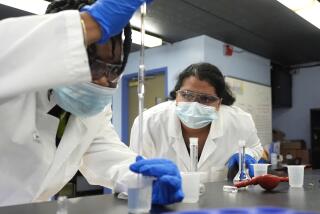Norwegian Wins Economics Nobel Prize : Awards: The professor, however, calls the prize ‘quite irrelevant to the real issues.’
Trygve Haavelmo, a Norwegian professor who dislikes awards for academics, won the Nobel Prize in Economics on Wednesday for using statistics and probability to forecast how economies behave.
Haavelmo “had a swift and path-breaking influence” on the new science of econometrics with his probability theory, the Royal Swedish Academy of Sciences said in announcing the award. Econometric methods are used by banks and other institutions in making economic projections.
“I am honored. Anyone would be. But I had nothing to do with making this award. I really have nothing to say,” Haavelmo, 77, said in an interview.
The prize “is quite irrelevant to the real issues. I’m exhausted and I have nothing more to say,” he added.
In his 1941 doctoral dissertation for Harvard University, Haavelmo pioneered the field of econometrics, which introduced statistical probability to economic testing and forecasting.
The thesis was published in 1944. Ten years later he published a book of his research on economic development theory.
The Academy of Sciences said in its citation that Haavelmo was awarded the $469,000 prize “for his clarification of the probability theory foundations of econometrics and his analyses of simultaneous economic structures.”
Assar Lindbeck, head of the academy’s prize committee and a personal friend of Haavelmo, called him “the father of modern econometrics” and a dominant figure in post-war economic theories.
“As soon as you take a serious report in your hand or a long-term projection, it is econometrics that charts the relationship between all quantitative economic analyses,” Lindbeck told reporters.
Haavelmo was the second Norwegian to win the economics prize since it was introduced in 1969 by the Bank of Sweden and added to the five other Nobel prizes. Ragnar Frisch, who once employed Haavelmo as a research assistant, won the prize in its inaugural year.
Haavelmo is a member of the American Economic Assn. and the American Academy of Arts and Sciences.
He was born Dec. 13, 1911, in the town of Skedsmo a few miles east of Oslo, the son of a school administrator. He graduated from the University of Oslo in 1933.
He moved to the United States in 1939, at the outbreak of World War II, on a Rockefeller grant and worked at the University of Chicago and later in New York with the Norwegian Trade Ministry.
Haavelmo’s doctoral thesis won him immediate recognition. A think tank of young economic scientists from several nationalities, the Cowles Commission, was created to pursue the ideas he raised and other theories.
Haavelmo returned to Norway in 1947 and became professor of economics at the University of Oslo.
“I see Haavelmo as an original thinker but one who always kept his theories relevant to the real world,” said Thorvald Moe, of the Norwegian Finance Ministry.
According to his sister-in-law, Margit Haavelmo, he never married and his only brother died five years ago.
More to Read
Start your day right
Sign up for Essential California for news, features and recommendations from the L.A. Times and beyond in your inbox six days a week.
You may occasionally receive promotional content from the Los Angeles Times.






